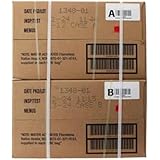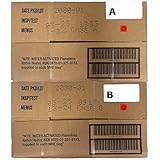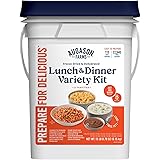Table of Contents
- Government Websites for Disaster Preparedness
- Trusted Non-Profit Organizations
- Educational Platforms and Online Courses
- Books and Publications
Government Websites for Disaster Preparedness
FEMA’s Comprehensive Resources
When I started looking for reliable disaster preparedness guides, one of the first places I turned to was FEMA’s website. They have an extensive range of resources that cover just about every type of natural disaster you can think of. From hurricanes to earthquakes, they have detailed guides that not only prepare you for the catastrophe but also offer recovery tips.
It’s easy to get lost in the sea of information available online, and I found FEMA’s guidelines to be well-organized and easy to understand. They even have printable checklists, which I found extremely handy when I was putting together my own emergency kit.
FEMA also offers various training programs and resources for communities to help prepare on a larger scale. If you’re keen on getting your neighborhood disaster-ready, this is a fantastic place to start.
Ready.gov’s Actionable Plans
Another excellent government resource is Ready.gov. They break down preparedness into simple, actionable steps that anyone can follow. When I was putting together my family’s emergency plan, Ready.gov was my go-to guide. They even have a section for pet preparedness, which was particularly useful since I have two dogs.
Ready.gov also covers a range of topics including how to build an emergency kit, which was super helpful for me. They emphasize the importance of having a communication plan in place, which I hadn’t considered before.
One of the best things about Ready.gov is their inclusiveness. They have resources available in multiple languages and make sure to include steps that are inclusive for people with disabilities.
Local Government Resources
Your local government can also be a treasure trove of information. Many cities and counties have their own emergency management offices, and their websites often contain localized disaster preparedness guides. I found that these resources are tailored to specific regional risks, which can be incredibly useful.
By checking my local government’s website, I found information on evacuation routes, local shelters, and even community training sessions. Sometimes, they also have alerts and notifications that can be sent directly to your phone.
== > What if ... Get a FREE Subscription to PREPARE
These local resources often provide real-time updates during disasters, which is invaluable when you’re in the middle of a crisis. Plus, it’s comforting to know that the information is specific to my area.
Trusted Non-Profit Organizations
The Red Cross
The Red Cross is a globally recognized organization that offers a wealth of information on disaster preparedness. When I was setting up my disaster kit, their guides were incredibly helpful. They have detailed instructions on how to assemble first aid kits, which can be crucial during an emergency.
I also appreciated their emphasis on training. They offer courses in CPR and first aid, which I took advantage of to better prepare myself and my family. Being certified in these areas gave me an added sense of security.
The Red Cross also provides mobile apps that offer real-time weather alerts and emergency preparedness tips, which are invaluable tools to have at your disposal.
National Safety Council
Another fantastic resource is the National Safety Council. They focus on fostering safe environments and offer various safety training programs. From online courses to community workshops, there’s something for everyone looking to improve their disaster readiness.
Their website offers a range of downloadable resources, including checklists and safety tips, which I found really useful when prepping my own emergency plans. The information is straightforward, easy to digest, and incredibly practical.
What sets the National Safety Council apart is their focus on education. They have a range of informative articles and videos that can help you understand the science behind various types of disasters and how to best prepare for them.
World Health Organization
The World Health Organization (WHO) may not be the first place you think of for disaster preparedness guides, but they offer a lot of valuable information. They focus on health-related emergencies, which is incredibly important in any disaster scenario.
When I was researching for pandemic preparedness, WHO was my primary source of information. They offer detailed guides on how to stay safe during health crises, which is something I found lacking in other resources.
Additionally, they provide advice on mental health during disasters, which is often overlooked but extremely crucial. The WHO’s resources are comprehensive, well-researched, and globally recognized, making them a trustworthy guide.
Educational Platforms and Online Courses
Coursera and EdX
Educational platforms like Coursera and EdX offer various online courses focused on disaster preparedness. When I wanted to dive deeper into the subject, these platforms provided me with structured, in-depth courses that were invaluable.
The courses are usually taught by experts from top universities, which gave me confidence in the quality of the information. They cover everything from the basics of disaster response to more specialized topics like urban disaster risk reduction.
One of the perks is the flexibility these online courses offer. I could learn at my own pace, which was particularly convenient with my busy schedule. It’s a great way to gain a comprehensive understanding of disaster preparedness.
Khan Academy’s Resources
Khan Academy, generally known for academic tutoring, has also started offering courses and materials related to disaster preparedness. I found their approach very user-friendly, with a lot of emphasis on interactive learning.
They provide video tutorials, quizzes, and practical tips, which made learning about disaster preparedness more engaging. For someone like me who learns best through visuals, this was incredibly helpful.
Khan Academy also caters to a younger audience, making it a great resource if you have kids and want to start teaching them about disaster preparedness early. It’s never too soon to start educating the younger generation about staying safe.
Community Colleges and Local Workshops
Don’t overlook local educational resources like community colleges and workshops. Many of these institutions offer courses on disaster preparedness, which can be quite enriching. I attended a workshop at my local community college and found it extremely beneficial.
These courses often include hands-on training, which I found very effective. Learning how to use a fire extinguisher or perform CPR in a controlled environment can make a huge difference in an actual emergency.
Community workshops also allow for networking with like-minded individuals. It was comforting to meet others who were equally passionate about being prepared, and I even found a few neighbors who wanted to create a community preparedness group.
Books and Publications
“The Disaster Preparedness Handbook” by Arthur T. Bradley
Books can be an invaluable resource for disaster preparedness, and one that stood out to me was “The Disaster Preparedness Handbook” by Arthur T. Bradley. This comprehensive guide covers a wide range of scenarios and offers practical tips that I hadn’t found elsewhere.
Bradley’s book is easy to read and packed with useful information, from water purification methods to communications strategies. I particularly appreciated the real-world examples he included, which made the information much more relatable.
If you’re someone who likes having a physical book to reference, this is a must-have addition to your library. It’s been a game-changer for me in how I approach disaster preparedness.
“Emergency War Surgery: The Survivalist’s Medical Desk Reference”
For those interested in the medical aspects of disaster preparedness, “Emergency War Surgery” is an excellent resource. This book dives deep into medical procedures you might need to perform in an emergency, and it’s written in a way that’s accessible to non-medical professionals.
The book is full of illustrations and step-by-step guides, which I found incredibly helpful. Medical emergencies can be daunting, but having this book as a reference gave me a lot of confidence.
It’s a little more specialized, but if medical preparedness is something you want to focus on, this book is well worth the investment. It has certainly earned a permanent spot on my bookshelf.
Popular Magazines and Journals
Regular publications like Popular Mechanics or even specific disaster preparedness magazines can also be incredibly informative. I like to keep up-to-date with the latest tips and technologies, and these magazines often cover cutting-edge advancements in disaster preparedness.
They also feature real-life stories and case studies, which can provide valuable insights and lessons. I find these narratives particularly inspiring, as they show the resilience and ingenuity of people facing crises.
Subscriptions to these magazines also usually come with access to archives and online resources, giving you a treasure trove of information at your fingertips. It’s a great way to stay informed and continually improve your preparedness strategies.
Frequently Asked Questions
1. What is the best resource for general disaster preparedness?
FEMA’s website is an excellent starting point. They offer comprehensive resources that cover a broad range of natural disasters and provide actionable steps to prepare for each one.
2. Are there any specific resources for medical preparedness?
Yes, “Emergency War Surgery: The Survivalist’s Medical Desk Reference” is a great book for understanding medical procedures during emergencies. The World Health Organization also offers valuable guides focused on health-related emergencies.
3. Do online courses offer practical tips?
Absolutely. Platforms like Coursera and EdX provide structured courses taught by experts. These courses often include practical tips and real-world scenarios, making them very effective for learning disaster preparedness.
4. How can I involve my community in disaster preparedness?
Check out your local government resources and community colleges for workshops and training sessions. These events are great for networking and building a community readiness group with your neighbors.






